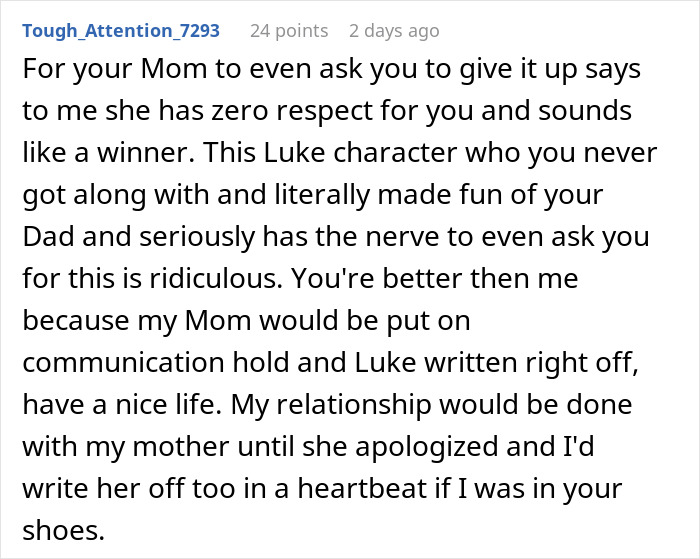Some families have a very entitled view when it comes to property. Familial ties and bonds can very quickly disintegrate when it’s time to divvy up inheritance or when someone has more than someone else.
A woman asked the internet if she was wrong to categorically refuse to give her stepbrother a cabin she inherited from her late father. Her family insisted on guilt tripping her over and over again, arguing that he needed it more than her. We reached out to the woman who shared the story via private message and will update the article when she gets back to us.
Property is one thing some families get into fights over

Image credits: cottonbro studio / pexels (not the actual photo)
So one woman wondered what to do when her relatives wanted her to hand over a cabin to her stepbrother









Image credits: ufabizphoto / freepik (not the actual photo)


Image credits: Actual_Visit1720
Who gets what after someone passes can cause a lot of family drama

Image credits: freepik (not the actual photo)
When a family member comes into an inheritance, it often sparks a surprising sense of entitlement among relatives who suddenly view that windfall as if it were common property rather than a personal gift. This dynamic usually springs from a shared history of mutual support, helping one another through financial tight spots, chipping in for birthdays and graduations, and pitching in on household chores. Those collective efforts create an invisible ledger of favors and sacrifices, and when one person receives a lump sum, other family members instinctively feel as though their past contributions entitle them to a share.
Beyond that unspoken IOU system, there is something of a “grass-is-greener” mentality in play. It’s human nature to imagine how an inheritance could change someone’s life, eliminating worries, opening doors, or funding long-postponed plans. When relatives see what one person could achieve, they project their own unmet dreams onto the inheritance and, consciously or not, start lobbying for a piece of it. Rather than celebrating someone’s good fortune, they focus on what they themselves might have done with the money, which turns admiration into pressure.
It can also create a false impression that since this person (in this story, the woman), never actually “paid” for the property, it should be easy to just “give it away. This isn’t true, but when you don’t have something, it’s a lot easier to imagine simply selling or handing it over.
Memory also complicates matters. Families often recall times when resources were shared freely, pooling money for reunions, covering a relative’s emergency medical bill, or helping with college tuition. These episodes reinforce a collective mindset: money flows in and out of the family network, constantly circulating until everyone is taken care of. But an inheritance breaks that cycle by introducing a one-way transfer that wasn’t earned through joint effort. That break in the usual pattern can feel jarring, leading family members to assume that the new funds owe a return trip through the family before they belong to the individual.
Some families are willing to fight over material things

Image credits: senivpetro / freepik (not the actual photo)
There’s also the issue of changing power dynamics. When someone suddenly acquires extra resources, they gain newfound flexibility, financial security, ability to make larger purchases, or capacity to help others in different ways. Relatives who were accustomed to the prior balance may feel a loss of influence or fear that their own needs will be deprioritized. In response, they may assert claims on the inheritance, not purely out of greed, but as a way to reestablish equilibrium in family relationships. In this story, they seem to truly believe that she has a moral responsibility to “help” her stepbrother. However, her family also muddy the waters, as they insist they literally give him the cabin instead of just allowing him to stay there for a bit.
Negotiating these tensions requires compassion and clear communication. The person who inherits should acknowledge the family’s history of mutual support and express gratitude for that shared foundation. At the same time, they must assert the personal nature of the gift and the right to decide how it’s used. Establishing boundaries, whether through honest conversation or, in some cases, a written agreement, helps prevent lingering resentment.
It’s important to remember that an inheritance is intended as an individual benefit. Respecting that intention preserves not only the value of the gift itself but also the integrity of family bonds. When everyone’s expectations are laid out openly, the focus can return to support and celebration, rather than conflict over who “deserves” what. Jealousy and entitlement, ultimately, are good ways to completely break down family bonds.
One commenter gave some advice

Most folks thought she did nothing wrong




























